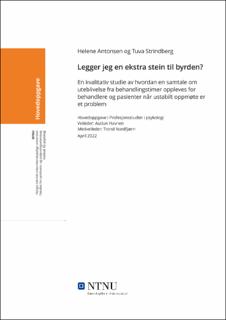| dc.description.abstract | Bakgrunn: Uteblivelse fra timer har en negativ påvirkning på pasient, behandler,
behandlingsutfall og helsesystemet. Dette er et gjennomgående problem i rusbehandling, og
spesielt blant unge voksne. Ettersom det er et så vanlig problem, har studien valgt å
undersøke hvordan det oppleves for både pasient og behandler å prate om uteblivelse fra
behandlingstimer når ustabilt oppmøte er et problem.
Metode: Syv pasienter i behandling ved Psykiatrisk ungdomsteam (PUT) ved Nidaros
distriktpsykiatriske senter og fem behandlere ble intervjuet. Det ble brukt semistrukturerte
intervju og dataene ble analysert kvalitativt ved hjelp av tematisk analyse.
Resultat: Pasientinformantene hadde større fokus på forutsetningene for at samtalen
om uteblivelse skulle være greit for dem, enn hvordan samtalen om uteblivelse fra
behandlingstimer opplevdes. Det første hovedtema i denne gruppen var Det krevende
relasjonelle, som beskriver hvordan pasientene har behov for tid til å bli trygg og klare å
være ærlig. Tilpasse seg pasienten handler om at pasientene ønsker at behandleren er opptatt
av å forstå dem som mer enn en pasient og gir tilstrekkelig informasjon. God kommunikasjon
om vanskelige tema beskriver at pasientene har behov for at behandleren toner seg inn på
pasienten og stiller åpne spørsmål om uteblivelse fra behandlingstimer.
For behandlergruppen ble det identifisert to hovedtema: Samtalen er en fasilitator og
Ambivalens, med tre tilhørende tema. Samtalen er en fasilitator handler om at behandlerne
ser samtalen om uteblivelse fra behahandlingstimer som en mulighet til å få mer innsikt i
pasientens forståelse og behov, samtidig som det kan styrke den terapeutiske alliansen og de
sammen kan finne praktiske løsninger for å forhindre ustabilt oppmøte. Ambivalens beskriver
en generell usikkerhet knyttet til hvordan de skal forstå uteblivelser, hvilken effekt samtalen
har og når denne samtalen er hensiktsmessig.
Konklusjon: Behandlerinformantene uttrykte at de ønsker å tematisere uteblivelse
oftere med pasientene sine. Pasientinformantene var opptatt av fordelene med å ha vanskelige
samtaler, inkludert om uteblivelse fra timer, og uttrykket et behov for støtte rundt slike
samtaler. Samtidig har den aktuelle pasientgruppen belyst hvordan de som gruppe har en
sårbarhet knyttet til å føle seg avvist når uteblivelse blir adressert. Dette kan gjøre samtalen
om uteblivelse utfordrerne for begge parter. Det fremgår i den aktuelle studien at behandlerne
kan trenge mer ekstern støtte og retningslinjer for å redusere antallet usikkerhetsmoment de
opplever knyttet til å vurdere tematiseringen av uteblivelse. Dette kan trolig øke behandlernes
terapeutiske tilstedeværelse, noe som vil kunne øke sannsynligheten for at pasientene får en
positiv opplevelse av relasjonen til behandler og behandlingstimen. | |
| dc.description.abstract | Background: Absence from therapy sessions is a frequent issue in treatment for
substance use disorders (SUD), especially among young adults. This negatively affects
patients, therapists, treatment outcomes and the health care system. As it is such a widespread
problem, there is a need for more research on how patients and therapists experience talking
about non-attendance when unstable attendance is a problem.
Method: In this study, five therapists at the Psychiatric Youth Team (PUT) at Nidaros
District Psychiatric Center and seven patients were interviewed. Semi-structured interviews
were used, and the data were qualitatively analysed using thematic analysis.
Result: The responses from the patient group highlighted the necessary preconditions
for a meaningful conversation about treatment attendance. The first main theme that emerged
was The relationship is demanding, which describes how patients need time to become
confident and honest in the relationship with the therapist. The second theme was Adapting to
the patient, which connected to the patients’ desire to be seen by the therapist in a holistic
way, in addition to providing relevant information. The third main theme was Good
communication on difficult topics, which described patients’ needs for therapists to tune in
and ask open questions about attendance.
Interviewees from the therapist group discussed potential outcomes and uncertainties
of initiating conversations regarding attendance. The first main theme that emerged was The
conversation is a facilitator. In this theme, the therapists understood the conversation as an
opportunity to 1) understand how the patients were thinking 2) strengthen the alliance
between therapist and patient, and 3) find practical solutions to prevent non-attendance. The
second main theme was Ambivalence, which highlighted the therapists’ uncertainty regarding
the interpretation of non-attendance, impact of the non-attendance conversation, and its
timing.
Conclusion: The main finding of the study was that therapists want to address non-
attendance more often with patients. Patients see the benefit of having difficult conversations,
including non-attendance, however, require support to do this. For patients, it was clear they
often felt rejected when non-attendance was addressed, making this conversation a challenge
for both parties. This study found that therapists may need additional support and guidelines
to reduce uncertainties when debating to initiate a non-attendance conversation with patients.
Reduced uncertainties could reinforce therapeutic presence, which could increase the
probability that the patient has a good experience of the relation and the therapy session. | |
